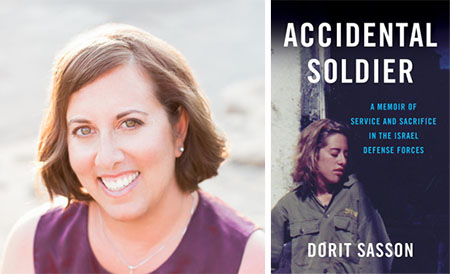Running a crowdfunding campaign is not just a trendy approach to funding a book through a public Internet campaign, but it is also a great way to build your author platform. For forty-five grueling days, I reached out to more than two thousand family members, friends, and acquaintances in attempt to fund my memoir, Accidental Soldier: A Memoir of Service and Sacrifice in the Israel Defense Forces. There are several online crowdfunding platforms available to authors, including Kickstarter, one of the more veteran platforms that works on an “all-or-nothing” model in addition to Indiegogo and Publishizer, which allow you to keep what you raise providing you’ve reached a minimum threshold.
I chose Pubslush for two main reasons: 1) it was the only crowdfunding platform at the time that worked exclusively with writers and authors 2) I could keep all the money raised, even if I didn’t reach my financial goal, providing I reached a minimum of $500. Plus, only 1% was taken out from each contribution—the lowest percentage of all the crowdfunding platforms. Although Pubslush is no longer in operation, similar book-only platforms, like Publishizer, can help you connect with hundreds of literary agents and publishers through their database, which can be a vital component to your campaign’s success.
As I planned, I would soon learn that launching my campaign would take a ton of dedication, enthusiasm, and organization. These eight steps helped me with finding sponsors and building my platform.

“Reaching out and connecting with my readers before my memoir was published was the most gratifying aspect of conducting a crowdfunding campaign.”
(Photo: Kathy Pooler)
1. Test for a marketable story:
This is a key stage that is often overlooked by prospective crowdfunding authors. Kathy Pooler, author of Ever Faithful to His Lead: My Journey Away from Emotional Abuse, knew she struck a chord when readers started leaving her comments on her blog posts about how deeply her story of finding freedom from an abusive relationship spoke to them. “Reaching out and connecting with my readers before my memoir was published was the most gratifying aspect of conducting a crowdfunding campaign,” she says.
Before my memoir was published, I blogged about serving in the Israel Defense Forces as an American immigrant. I inserted relevant quotes from the book in each post. Soon after, Facebook friends commented on posts. When the time came to launch my campaign, my book idea and message had been tested, resulting in supporters.
2. Create a compelling landing page:
From my talk with Amanda Barbara, former CEO of Pubslush, I learned that a good first impression depends on three key elements: a video describing the book project, enticing book copy, and compelling rewards. The landing page on the Pubslush site featured a short video describing my painful experience of leaving New York City to serve in the Israel Defense Forces.
For his Kickstarter campaign, Frank Thomas, author of Rise: Even Death Can’t Stop Me: The Frank Thomas Story, created a video of himself holding handwritten signs telling the painful story of overcoming adversity while strong vocal music played in the background. “That video engaged people deeply at the core of their emotional existence.” The result? Over time, the video gathered 300,000 Facebook shares and nearly 8 million views.
3. Offer exciting and affordable rewards:
In return for backing my book, I offered my supporters a variety of incentives ranging from a lecture, a writer-in-residence visit, a luncheon, and a memoir writing lesson on Skype. I was able to attract 100 supporters, mainly due to the fact that I offered a print copy of the book at a reasonable reward amount. (I found that many supporters also opted in for the e-book reward because it was at a lower price point.) In the end, I wanted my project to be memorable and compelling enough to incentivize contributors to the campaign.
Here’s how I set up my rewards page:
$1 Every Dollar Counts! Forever grateful!
$10 - Personal thank you on the Accidental Soldier Author Page.
$20 - E-book version of the book, Accidental Soldier.
$30 - Receive a print copy of Accidental Soldier.
$50 - Receive a SIGNED print copy of Accidental Soldier. PLUS, you’ll receive an invitation to attend a “LIVE” reading (via teleconference) of the introductory chapter.
$75 - Includes all of the above rewards PLUS a copy of the bestselling Amazon anthology Pebbles in the Pond: Transforming the World One Person at a Time of which I am a featured author.
$500 - You are philanthropic and incredibly generous backer. You’ll receive all of the above rewards, PLUS, you’ll be acknowledged on the special acknowledgements page of the book (with your permission). In addition, I’m including a special personal Skype mini-lecture on the topic of memoir writing followed by Q & A, where you can answer any questions about the memoir writing process, the book, my life, and/or experiences.
$1000 - You are wonderfully generous! You’ll receive all of the above rewards, PLUS, you’ll receive a writer in-residence type lecture either via Skype or in-person. (This is based on a three-hour travel radius from my home.)
$5,000 - Makes you an incredible inspiration! You’ll receive all the above rewards, including my special thank you on the acknowledgements page of the book (with your permission). PLUS, I will deliver an inspiring keynote speech and book signing at a school, business, club, or nonprofit of your choice anywhere in the continental US.
$10,000 - Your pledge will help me change the world. I will host a private dinner for you plus 7 guests at a local restaurant in any city in the continental US, where I will do a reading of key excerpts of my book; and we’ll have a quaint, personal, and candid Q&A, where you and your guests can ask any and all questions about my life and story. Plus, you’ll receive a prominent and extra special thank you on the acknowledgements page of the book (with your permission), where your name or organization’s name will be immortalized as the highest level contributor in making this project happen.
4. Create a strong, personal outreach:
This is key to any successfully funded campaign! Money won’t magically appear from a single Facebook post. You will gain financial support when you send out individual emails to those who you feel will be drawn to back up your project. But you should realize that not everyone will be able to back up your project. Amanda Barbara, former CEO of Pubslush, says that 95-98 percent of successfully-funded campaigns come from the support of family and friends.
After my fans were sold on the premise of the book, they started sharing the book with their networks primarily on Facebook. It was fascinating to see how this spiraled and developed. Soon enough, their networks would pay attention to my campaign, which would result in additional supporters and funding—all due to word of mouth. In many cases, I didn’t even know that person’s friend on Facebook! From this, I learned that word-of-mouth, especially on social media, is very powerful. It can sell anything.

“The hardest challenge about taking on a crowdfunding campaign is educating the public how it exactly works.”
(Photo: Amanda Barbara, former CEO of Pubslush)
5. Line up backers before the beginning of the campaign:
I came up with a list of ten people who I intuitively knew would support the campaign and approached them before the launch to coordinate their support. This way, there was already evidence of support when new supporters visited my crowdfunding page, and it showed that I had already gathered a following. By the end of the first week, I had enough funding to validate visitors who maybe didn’t know me that my memoir was worth checking out.
6. Teach fans about crowdfunding:
In each email, I explained what crowdfunding was and how each person’s money would be put to use. This is also a very important step to remember and one that many authors inadvertently forget! I felt I owed my network an explanation that I was not raising funds to pay my mortgage or electricity bill as several potential supporters were already expressing mistrust, especially when it came to sharing their credit card information—even though they knew me!
I would then explain that when people back up my project, they get a copy of the book and pointed them to the incentives I described on my landing page of the campaign. “The hardest challenge about taking on a crowdfunding campaign is educating the public how it exactly works,” says Barbara. In each email, I explained that I would be using the funds to offset expenses relating to publishing, such as a cover designer, layout, production, and proofreading as well as publicity and marketing.
7. Increase your online visibility:
Launching a crowdfunding campaign is a perfect opportunity to build your online platform. According to Forbes.com and PCworld.com, the higher the number of Facebook friends you can share your idea with, the better your chances are for a successful crowdfunding campaign. But online visibility does not start and end with Facebook alone. To help keep the news of my campaign on the online radar, I used these online marketing strategies:
- I asked on Facebook if there were any writers in the house that would like to host me as a guest blogger, where I would blog on a variety of relevant writing topics. After my posts were shared on social media, I started responding to the bloggers who were enticed by my project and some followed the link to the landing page. I also reached out to groups and organizations who featured memoir writers and global themes relevant to my book.
- I blogged about the themes, lessons, and takeaways in my book without posting full chapters. Then, I shared the links with relevant forums and groups to drum up additional interest.
- I created a marketing campaign for my contact list that included a short video announcing the campaign and the rewards prospects would receive should they support it.
8. Get noticed locally:
There is no better way to drum up interest about a project other than connecting with the people in your community rather than trying to run down strangers in either an online or offline environment, where you don’t have any connections. I participated in a number of author events at libraries and community centers, whether it was a panel or a reading. To find these opportunities, I reached out to a number of libraries on my own and pitched my talk as well as to a number of book clubs I discovered through meetup.com; plus, I also contacted local rotary clubs. This helped to get my book on the “local radar.”
“Crowdfunding is truly a grassroots operation, and 100 percent of the success rests on the author’s shoulders.”
In the end, I was able to acquire one hundred supporters in forty-five days and much needed publishing and marketing funds. However, I did not reach my financial goal of $15,000 for one main reason: the e-book and print versions should have been listed at a higher price point. Now that I’m writing book number two, I intend to reach out to those initial supporters about it should I decide to launch a second crowdfunding campaign with the intention of pricing the rewards for the ebook and print version at a higher price point, so I can reach my financial goals.
What about the people who did not support the campaign for Accidental Soldier? After the campaign finally finished, I circled back and informed them that my book was now live and shared the link.
The main piece of advice is to do your research when choosing a crowdfunding platform to increase your chances of getting funding. According to Kickstarter, which funds a variety of crowdfunding projects, only 32.12% of their publishing campaigns are successful. So perhaps authors are better off going with book-only platforms like Publishizer, whose focus is building a community while supporting their author clients. Crowdfunding is truly a grassroots operation, and 100 percent of the success rests on the author’s shoulders. While running a forty-five day campaign was indeed exhausting, it did create pre-marketing buzz and helped with honing my marketing message, and those were priceless lessons.
***

Dorit Sasson is a copywriter, content marketing strategist, speaker, and author. She is the founder of “Giving Voice to Your Courage” podcast and website. She supports heart-centered business owners and helps authors build visibility and increase engagement as thought leaders. Her groundbreaking memoir Accidental Soldier: A Memoir of Service and Sacrifice in the Israel Defense Forces is a finalist for the next Generation Indie Book Awards and Santa Fe Literary Awards and is also a widely read handbook on how to become more courageous in life.
-----
Enjoyed this article? Check out these related discussions on WOW! and WOW’s blog, The Muffin:
How to NOT Build an Author Brand: Learn from My Mistakes
Making Short Work of Your Digital Platform
How to Promote with Pinterest
Facebook: Best Practices for Profiles, Pages, Groups, and Posts